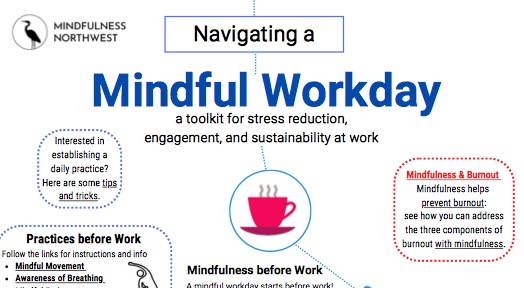Recently we were asked to provide a workshop for one of our clients on “Pandemic Fatigue” and I realized: yeah – that’s a thing now isn’t it?
It’s been a long hard slog for all of us. For some, suffering the loss of someone close to us or losing one’s job has been devastating. Although not exactly the same, all of us have had some level of disruptive changes in our lives: the social restrictions, the masks, the isolation. All of these have taken their toll. Questions about the future are in our minds, too: Is there light at the end of the tunnel? What will the “new normal” be? Will it ever really end?
I bottomed out a little on all of this recently myself. Maybe you have too?
My recent flash point was that I’d really hoped we could offer more in-person programs this fall – but it looks like that won’t be the case. I’d already let go of this same hope for summer. Season after season through the pandemic as we’ve planned our Mindfulness Northwest schedule, I’ve been hoping, hoping, and then letting go. This time around was the hardest one. But I bet it won’t be the last. Thank goodness online programs work as well as they do.
What have your recent flash points been in your patience practice? Schools opening or not opening? Being able to see relatives in nursing homes finally, or not? Waiting to travel again?
My recent upset helped me see there was a way I was figuratively “holding my breath” waiting for a big change in our Covid-limited reality. Time to remember to keep breathing. It will all go at the pace it goes and there isn’t a lot I can do about it. Have you also been holding your breath waiting for change? That’s a limited kind of patience with a built in expiration date. Sooner or later you can’t hold it anymore!
Pandemic Fatigue is a thing. So is Pandemic Patience. This seesaw of Covid ups and downs inspired me to reflect on how mindfulness and compassion training support being deeply patient with a chaotic and unpredictable world.
My Zen teacher, Norman Fischer, in his book The World Could Be Otherwise, talks about patience like this:
To practice patience is to patiently, tolerantly forebear hardships and difficulties — but not passively. The deep practice of patience is transformative. It transforms difficult circumstances from misfortunes or disasters into spiritual benefit. For this reason it is a particularly powerful practice, a prized and essential one. A person who develops it has strength of character, vision, courage, dignity, and depth. She or he understands something profound about human beings and how to love them.
Every time we sit down for formal mindfulness practice we’re practicing a form of this deep patience. We’re facing each moment that arrives; we’re working with our mind’s wish that this moment be other than how it is; we’re gently guiding ourselves back. We’re facing discomforts and difficult moods with curiosity and openness as best we can. We don’t jump up to fix the problems we think of, instead we stay in our practice and keep breathing.
And as we key into compassion, we find ways to invite kindness into these feelings of challenge. Norman suggests that patience helps us understand something profound about how to love human beings. And in turn, we discover that these same tenets apply to loving ourselves a little better, too.
As the pandemic continues, It’s been helpful for me to remember that patience isn’t just putting up with something. It’s a practice. It’s feeling into how resistance and complaint only make things worse. But it’s more than refraining from resistance and complaint. It’s a compassionate and mindful practice of actively accepting “this is how it is right now” and transforming our approach to, “What can I learn here? How can I help?”
Of course I’m far from perfect at this and I bet you’d say the same. And yet like every one of the positive qualities of the human heart, we can build and develop our patience. We can try to remind ourselves that what we practice grows stronger.
Maybe we started out thinking of patience being about putting up with other things. But in the end we see that it’s really a profound patience and love even as we work with our own human frailties and foibles. It’s also a profound sympathy for the struggles of others. We are truly in this together and patience is a natural response to the full catastrophe.
Wishing you all the best as we continue to navigate this time of such rapid change together…with patience,
Tim

